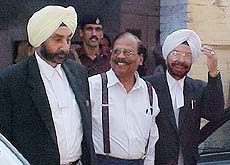'Direct goading necessary to convict one for abetting suicide'
 New Delhi, Jan 5 : The Supreme Court Tuesday held that to convict a person on charges of abetting suicide, he/she must be held guilty of performing a "positively direct act" of prompting the victim to commit suicide.
New Delhi, Jan 5 : The Supreme Court Tuesday held that to convict a person on charges of abetting suicide, he/she must be held guilty of performing a "positively direct act" of prompting the victim to commit suicide.
The ruling, which might eventually have some bearing on the criminal case of abetment of suicide of teenager Ruchika Girhotra against Haryana former police chief S. P. S. Rathore, was delivered by a bench of Justice Dalveer Bhandari and Justice A. K. Patnaik.
"It requires an active act or direct act, which led the deceased to commit suicide, seeing no option, and this act must have been intended to push the deceased into such a position that he committed suicide," said the bench, setting aside the conviction of a Andhra Pradesh farmer on charges of abetting the suicide of his farm worker.
"Abetment involves a mental process of instigating a person or intentionally aiding a person in doing of a thing. Without a positive act on the part of the accused to instigate or aid in committing suicide, conviction cannot be sustained," ruled the apex court.
"The intention of the legislature and the ratios of the cases decided by this court is clear that in order to convict a person under section 306 of Indian Penal Code (for abetment of suicide), there has to be a clear mens rea (guilty intention) to commit the offence," the bench added.
Quoting from another ruling of the apex court on the issue, the bench said: "There should be intention to provoke, incite or encourage the doing of an act (suicide) by the victim."
"Therefore, it is impossible to lay down any straight jacket formulae in dealing with such cases. Each case as to be decided on the basis of its own facts and circumstances," the bench said.
The ruling came on an appeal by Gangula Mohan Reddy, convicted by a trial court and later by the Andhra Pradesh High Court, of abetting suicide of his farm worker Ramulu.
Ramulu committed suicide two days after Reddy alleged that he had stolen some gold jewellery from his house. Reddy allegedly also pressed Ramulu for return of his loan.
The apex court set aside Reddy's conviction as the prosecution failed to prove any positive or direct act on his part leading to Ramalu committing suicide.(IANS)